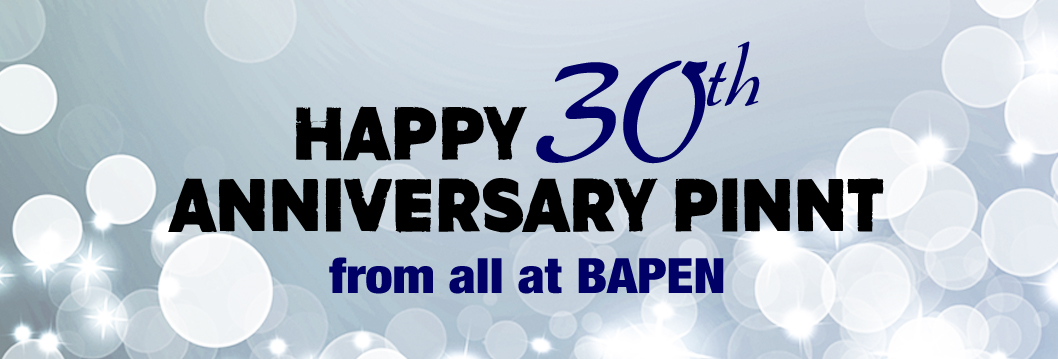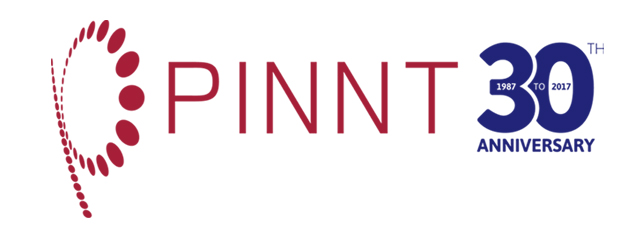
Celebrating 30 Years of PINNT
This issue of In Touch’s main feature is dedicated to PINNT who celebrate their 30th Anniversary during 2017. In a recent issue of PINNT’s membership newsletter (Online Issue 2 – 2017), Debbie Phillips, PINNT’s Membership Secretary, interviewed Carolyn Wheatley, Chair of PINNT, about her time with PINNT, how it all began, and the amazing things PINNT has been involved with and achieved over the years. Here we share some of the highlights from this inspiring interview.
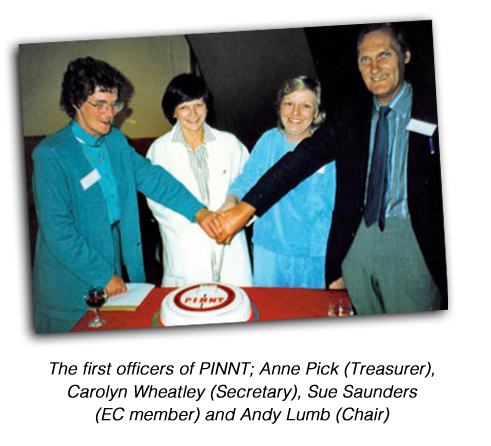
Tell us how PINNT came to be and how you became involved
Oh it’s a long story, I’ll start at the most relevant point. I’d been transferred from St Bartholomew’s Hospital in London to St Mark’s Hospital, City Road, where I’d been fortunate to be deemed suitable for a revolutionary new home therapy, parenteral nutrition (PN). Up until that point things were looking grim for me. My treatment was started and I also had major surgery at the same time. Six months later I was discharged. I found myself on an emotional rollercoaster; pleased to be home but isolated and still a long way from being back to normal. My follow-up went from weekly to fortnightly then to monthly.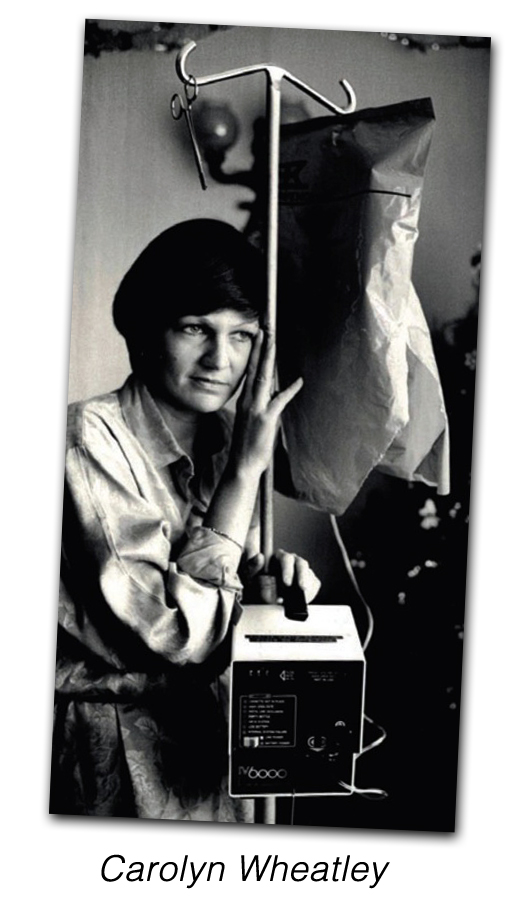 I was then promoted to quarterly clinic appointments. It was at one of these appointments that I arrived at the hospital and wandered into the chapel (that was our waiting room) and immediately thought that something was different. Instead of the usual chatter there was a small circle of people and they were referring to an agenda! I sat there having no idea what they were talking about but they were all familiar to me so I nodded in all the right places. Anne Pick, Andy Lumb, Joan Gascoigne, Sue Saunders and I were actually agreeing to set up PINNT.
I was then promoted to quarterly clinic appointments. It was at one of these appointments that I arrived at the hospital and wandered into the chapel (that was our waiting room) and immediately thought that something was different. Instead of the usual chatter there was a small circle of people and they were referring to an agenda! I sat there having no idea what they were talking about but they were all familiar to me so I nodded in all the right places. Anne Pick, Andy Lumb, Joan Gascoigne, Sue Saunders and I were actually agreeing to set up PINNT.
I left that afternoon as the secretary for PINNT. Anne was the Treasurer and Andy was the Chair. We were all PN patients and on a mission to create a charity that complemented the medical care we were receiving.
How did you plan to complement the medical care?
Discuss and solve all the challenges we faced at home that you had no idea about while in the hospital being prepared for discharge. Mobility in your home with hospital style equipment, storage, the associated emotions related to being responsible for your own care when possibly many miles from the hospital, collecting medical supplies and informing all the local services about parenteral nutrition and central venous catheters. One of the main factors was to reduce the isolation and burden of the treatment that people felt at the time when they went home. There was even mention in the early days about the potential of going on holiday! Anne had a narrow boat that had been modified, so, along with her husband Geoff and family, they could continue to enjoy it.
How easy was it to get PINNT established?
It was so hard, not because it was difficult but because we didn’t know where to start.
We bought a template constitution for £1 and set about reviewing what we needed to do. Bear in mind communications were so different then; we did it all by post and telephone. We all lived in different parts of the country so had to use our time wisely.
We arranged our clinic appointments at the same time so we could hold a PINNT meeting. I recall our decision to purchase fax machines as we progressed and how cumbersome they were, slow and very unreliable too!
Still we made progress and worked with a company called Travenol and the only homecare company at the time, Unicare (now Lloyds Pharmacy Clinical Homecare), to learn, gain support and seek advice. We also had the support of the nutrition team at St Mark’s who offered a lot of guidance and encouragement. They were really receptive to the formation of PINNT. As the months and years rolled by we made contact with many relevant companies as well as hospitals who were also looking after people such as us.
What challenges did you all face in those early days?
Lack of funds; we had no money so all we purchased and provided what we needed – stationery, travel costs and equipment. We all did this as a good will gesture. I recall being told I needed to buy a typewriter, I picked an electric one from a catalogue and paid for it weekly. We all gave what we could. We needed an identity, aims and objectives and all that went with setting up a charity. We learnt hard and fast; Andy and Anne were amazing, I respected them enormously; as the founding officers we became a dynamic trio. We sought the advice of people from industry who were keen to help us.
There must be many stories about those early days. Can you tell us about some of the highlights and memorable moments or occasions in PINNT’s history?
Honestly, I could write a book – it has often been suggested that I should. Here’s a short list:
- Meeting new patients – being able to sit and talk to people starting out on the same journey, being able to discuss those embarrassing or ‘silly’ questions. Offering reassurance; they weren’t alone. The joy and relief in peoples’ eyes upon initial contact is priceless.
- Fighting to change the rules about Attendance Allowance for people on PN – we went to Parliament and changed the guidance given to assessors (1987-88).
- The category of membership for Half PINNTers was created – in December 1991 we took over another charity and gave birth to Drippy Bear.
- Media campaign to provide free portable enteral pumps for patients – following a feature about a lovely little girl called Laura, the end of 1993, the generous readers of the Daily Mail and Mail on Sunday sent in over £22,000 so we could purchase pumps and supply them. It was overwhelming; we had to set up a formal review panel to access applications and the company who made the pumps offered a two-for-one scheme. This was in the days before portable pumps were generally available for enteral patients.
- LITRE – we created a special group to look at equipment and services. Patients and clinicians worked together and we created the small drip stand along with looking at many other projects and even writing a few papers for presenting at meetings. To this day LITRE has a role in reviewing portable PN feeding pumps.
- Growing the PINNT network – through many channels we are still able to spread the word about PINNT and our network grew.
- Being part of the formation of BAPEN – possibly one of the most significant moments in our history. Thanks to the wisdom of Professor John Lennard-Jones we were invited to send a representative to a working party being set up to look at the costs of malnutrition and how this had an impact on patients. In January 1992 a report was published ‘A Positive Approach to Nutrition as a Treatment’, which was published by the Kings Fund Centre, and led to the formation of BAPEN. PINNT was invited from the outset to have representation on the council; we’re still there today. Direct access to some of the great and good of nutrition!
- Professional groups and industry partners – working with professional groups who represent all the disciplines relating to home artificial nutrition as well as service providers and manufacturers. We can turn to all of these people to support and develop lots of projects for PINNT.
- Meetings and events – travelling around, in the days before social media and meeting people face to face. The joy, the fun and the camaraderie was amazing. We continue to encourage this. I have to say our weekend parties were absolutely fabulous and our fun days for Half PINNT.
- Producing literature – being able to print material and resources for members so they can feel supported or use it to start a discussion with other people.
- Networking around the world – Dawn Carter, our one-time Chairwoman and newsletter editor who is sadly no longer with us, travelled to the USA American patient conference with me so we could learn and share experiences. None of our trips were funded by PINNT. On one trip we were parted from our PN; thankfully between us we were able to sort it out and even laugh about it later. Our international network has grown considerably since then.
- Portable PN pumps – Dawn and I found portable PN pumps while at the USA conference one year and came home and campaigned until we had them. We had one to start with; and we worked tirelessly to develop this and then to secure a second one. I could write a whole newsletter on that topic alone!
- Online newsletter – it has really evolved over the years and continues to provide inspiration and encouragement for members.
- HAN Week – still a relatively new event for us, going from strength to strength.
- Patient representatives on all levels – from local meetings to government bodies and beyond! Our ability to professionally represent the patient experience has been received on so many levels.
The list is endless but the most important one to me personally has to be ‘making life-long friends’ – this really has to be why I have continued to support PINNT for over thirty years. Being able to share experiences and support people has been amazing. Seeing people achieve their goals which they thought were out of reach when they first made contact with PINNT. Giving people the confidence to believe in themselves; overcome the hiccups that they’ll encounter along the way and on some occasions facing the end of life with dignity and calm. I’ve said goodbye to so many dear friends but boy did we have some laughs along the way.
You’ve been invited to speak and represent patients and PINNT all over the world, does any one trip or presentation stand out to you, if so why?
I’m not going to say my trip to Australia which was amazing; it’s one much closer to home.
I had the enormous honour of being asked to present the Pennington Lecture at the BAPEN Annual Conference in Cardiff in 2009. I can feel the emotions rising even as I type this. I was adamant I didn’t have anything worthwhile to present. With unconditional support and encouragement from two BAPEN members, Dr Mike Stroud and Dr Marinos Elia, I agreed to do it.
The Pennington Lecture had been created as a mark of respect for Dr Chris Pennington, a Gastroenterologist from Dundee, who sadly passed away during his office as BAPEN Chair. I’m privileged to say I’d worked with Chris on numerous occasions through many BAPEN and PINNT activities. Only seven people had given this lecture before, each found it as moving as I did.
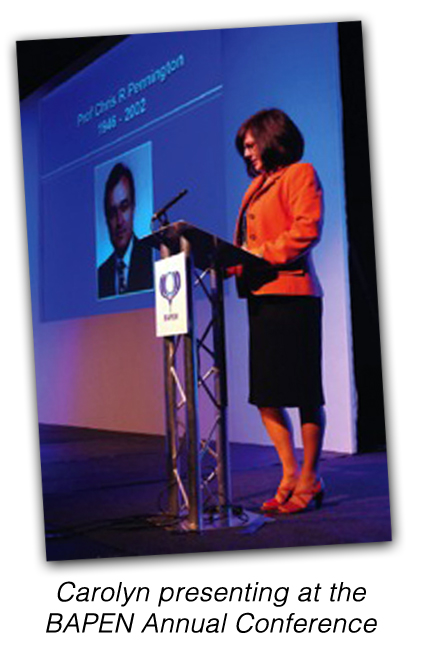
Forty long and scary minutes; you could hear a pin drop in the auditorium and 550 delegates remained attentive throughout – my ‘Journey of Discovery’ was well received.
When the lights up went I could see people wiping their eyes! Was I really that bad!!! The honour and pride was overwhelming. One of my mentors, Dr Mike Stroud, chaired this session and when we met half way across the stage at the end of my presentation his warm embrace kept my knees from buckling beneath me.
You’ve been given accolades and awards over the years for your voluntary work and the contribution you’ve made, does one mean a little bit more than the others?
My John Lennard-Jones Medal. It’s awarded by BAPEN ‘For outstanding work in clinical nutrition’. It has greater significance to me because it was awarded by my peers.
People who knew my personal struggles and deemed me worthy of such a prestigious award. I was the first nonmedic to receive this honour; I still treasure the folder with all the letters that were submitted by some truly eminent healthcare professionals to support my nomination. Also John Lennard-Jones was not only the founding chairman of BAPEN but the consultant who started my home parenteral nutrition journey. Together with Susanne Wood and Helen Dorey I became the person I am today – you can blame them!
Finally, any thoughts for PINNT as we mark our 30th anniversary?
I must pay tribute to everyone who has taken office or carried out a role for PINNT. Everyone has played a major part in PINNT’s story to date; it’s about being part of a team working together for the good of all PINNT members.
The story must continue; we need to identify people who can continue what’s been started. We must not lose what so many good people have worked tirelessly to achieve.
While I think social media has a place in the support network I don’t ever want to see the face-to-face contact disappear. PINNT has built so many amazing friendships over the years; we need to continue to respect people and work to continue making a difference for people on home artificial nutrition. We make mistakes, we don’t get things done fast enough at times but at least we keep on trying.
Acknowledgement: A huge ‘thank you’ to PINNT for sharing this interview with BAPEN members.
This week PINNT are running their 5th Home Artificial Nutrition Week HAN Week (7th-13th August 2017). For further information, please see their Core Group update or visit: www.pinnt.com
